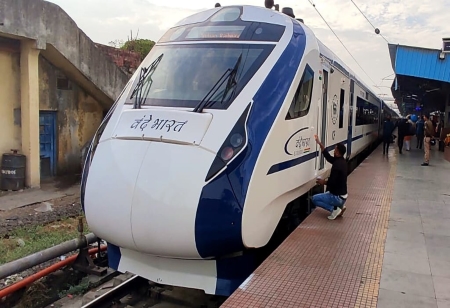
RVNL Consortium Wins Contract To Manufacture and Maintain 200 Semi-High-Speed Vande Bharat Trains

 As per officials, the process to manufacture 200 semi-high-speed Vande Bharat trains has advanced to the next stage, with Russia's CJSC Transmashholding and Rail Vikas Nigam Ltd (TMH-RVNL) consortium emerging as the lowest bidder for a 58,000-crore contract to manufacture and maintain the trains.
As per officials, the process to manufacture 200 semi-high-speed Vande Bharat trains has advanced to the next stage, with Russia's CJSC Transmashholding and Rail Vikas Nigam Ltd (TMH-RVNL) consortium emerging as the lowest bidder for a 58,000-crore contract to manufacture and maintain the trains.
The consortium of state-run Bharat Heavy Electricals Ltd (BHEL) and Titagarh Wagons was the second lowest bidder after the CJSC-RVNL consortium, they said, adding that it will be given a chance to match the lowest bid to win a share of the tender. According to the tender document, the selected bidder will build 200 sleeper train sets with 16 coaches each at the railway factory in Latur, Maharashtra, and the ICF in Chennai. The lowest bidder would be awarded the manufacture, supply, and maintenance of 120 trains under the bid conditions (L1). These would be manufactured at the Indian Railways' Latur facility.
The remaining 80 trains would be built at the Chennai plant and awarded to the lowest (L2) bidder if the price offered by the L1 was met.
Sources said to news agency PTI the consortium of TMH and Indian public sector unit RVNL has bid ₹120 crore per train set, less than the cost of the last Vande Bharat trains manufactured by ICF-Chennai at ₹128 crore a set.
TMH-RVNL outbid BHEL-Titagarh Wagons, which had quoted a train set price of Rs 140 crore, they said, indicating that the Russian company is eager to enter the Indian market and thus the low bid.
French railway major Alstom, the Medha-Stadler consortium between the Swiss railway rolling stock manufacturer Stadler Rail and Hyderabad-based Media Servo Drives and Siemens along with BEML were the other players in the fray for the tender.
The contract, worth 58,000 crore, calls for the manufacture and maintenance of 200 Vande Bharat trains over the next 35 years.
According to senior officials, whoever emerges as the new manufacturer will produce the trains using the current technology developed by the railways, railway staff, and its factories.
If the L2 bidder declines to accept the contract, it will be offered to the third lowest bidder. However, if none of the bidders are prepared to match the L1 bidder's bid, the entire contract will be awarded to them.
The supplied trains would also be maintained at six to eight train depots in cities such as Delhi, Mumbai, Bengaluru, Jodhpur, Kolkata, and Hyderabad, according to the document.